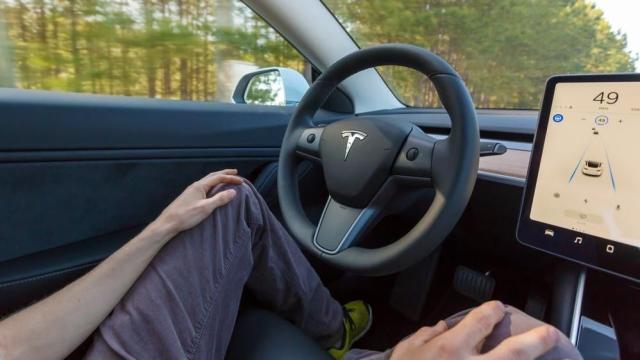The National Highway Traffic Safety Administration (NHTSA) is investigating Tesla vehicles for an “Elon Mode” feature that allegedly lets the driver-assistance system take over for drivers for an extensive amount of time. The administration ordered Tesla to hand over data surrounding its Autopilot feature in a July 26 letter that was published on the U.S. Department of Transportation website on Tuesday.
In the letter, the NHTSA told Tesla it was made aware that the Autopilot configuration could be enabled to take over for the driver while disabling the prompt that notifies drivers to apply torque to the steering wheel. The NHTSA wrote that it “is concerned that this feature was introduced to consumer vehicles and, now that the existence of this feature is known to the public, more drivers may attempt to activate it. The resulting relaxation of controls designed to ensure that the driver remains engaged in the dynamic driving task could lead to greater driver inattention and failure of the driver to properly supervise Autopilot.”
Drivers using Autopilot are required to keep their hands on the steering wheel, even while using the driver-assistance function, but if they remove their hands from the wheel, a symbol will blink on the vehicle’s touchscreen. However, a software hacker, known as @greentheonly, allegedly discovered if the driver leaves their hands off the steering wheel, the flashing will turn into a beeping noise, but if the driver still ignores the notification, the vehicle can disable the driver-assistance features for the remainder of the drive. The hacker posted a video to YouTube of him driving a Tesla vehicle for an extended period of time using the Autopilot feature, without being notified to place his hands on the wheel.
Automotive safety researcher and Carnegie Mellon University associate professor of computer engineering Philip Koopman told CNBC, “It seems that NHTSA takes a dim view of cheat codes that permit disabling safety features such as driver monitoring. I agree. Hidden features that degrade safety have no place in production software.”
The newest investigation comes after the NHTSA reported it is looking into more than a dozen identified Tesla crashes that hit stationary emergency vehicles. In June of last year, the agency also issued an updated probe into 830,000 Tesla vehicles for an engineering analysis, the step preceding a potential recall.
“We’ll get to a resolution (of the Tesla probe),” Acting NHTSA Administrator Ann Carlson told Reuters last week. Referencing Tesla’s advanced driver assistance systems, she added: “It’s really important that drivers pay attention. It’s also really important that driver monitoring systems take into account that humans over-trust technology.”
The NHTSA gave Tesla until August 25 to respond to the special order and provide all necessary documentation while noting if the company does not comply, it may be subject to civil penalties of up to $US26,315 per day. In a separate letter sent to the NHTSA on August 25, Tesla requested confidential treatment, leaving no version of their response available to the public. It is unclear if the NHTSA has responded.
